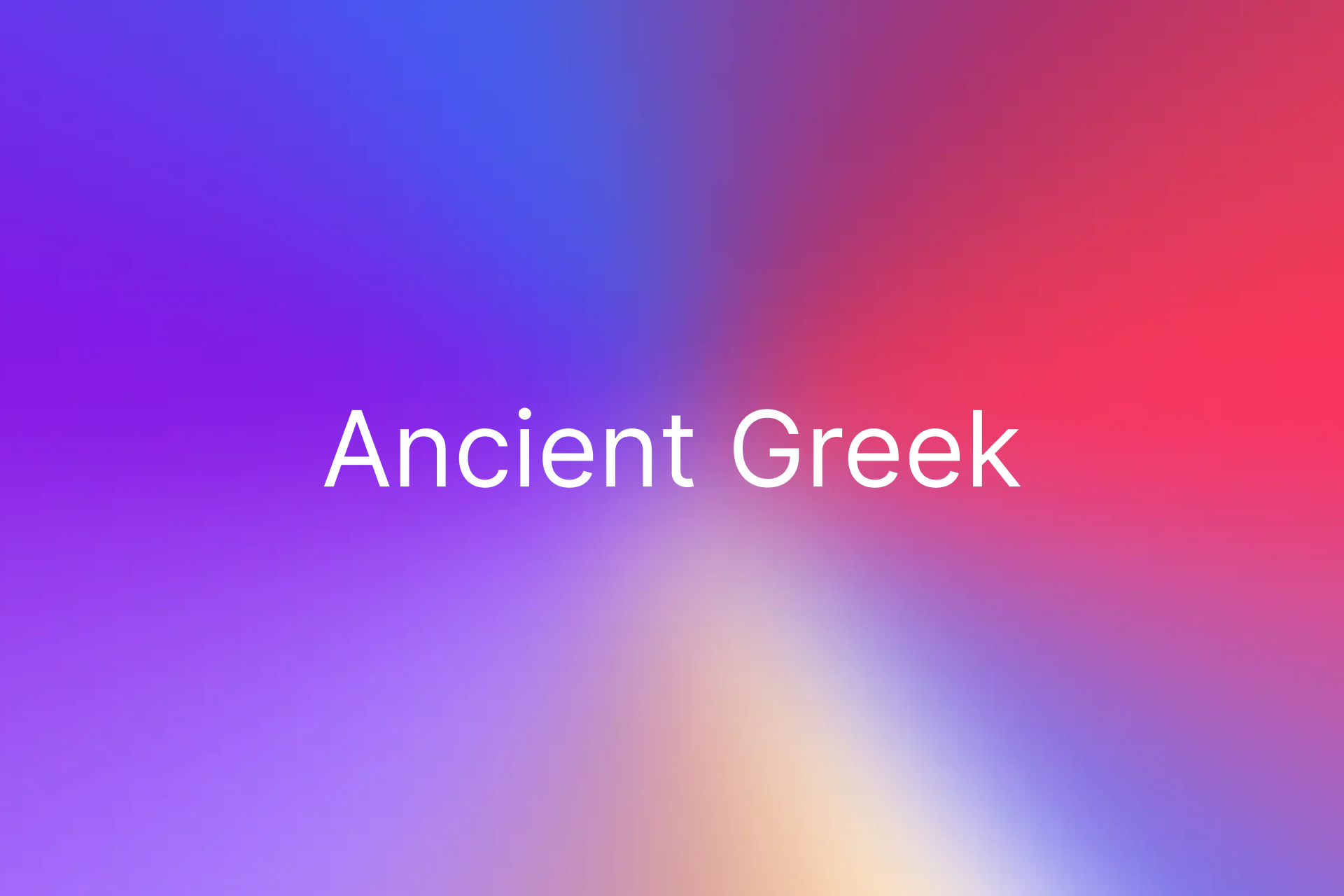Ancient Greek: The Language That Shaped Our World

TABLE OF CONTENTS
Ever wondered where words like “democracy,” “biology,” or “alphabet” come from? The answer is Ancient Greek, a language over 3,000 years old that’s woven into modern culture. From epic poems to the foundations of science, Ancient Greek is a living legacy. In this blog, we’ll explore its origins, revolutionary alphabet, influence on English, and why learning it can enrich your life—plus, a tool to make exploring it easier than ever. Let’s dive in!
What Is Ancient Greek?
Ancient Greek was spoken from roughly 1500 BC to 300 BC across Greece and the Mediterranean. It was the language of Homer’s The Iliad, Plato’s philosophical dialogues, and Aristotle’s ethical treatises, shaping literature, science, and politics (Mark, 2018). With dialects like Attic (from Athens), Ionic, Aeolic, and Doric, it reflected the diversity of ancient Greek society. Attic became the standard for classical works due to Athens’ cultural dominance (Encyclopaedia Britannica, 2023).
A Glimpse at Ancient Greek Language Structure:
-
Pronunciation: Ancient Greek has a phonetic alphabet, so most words are pronounced as written. Stress usually falls on one of the last three syllables, marked by an accent.
-
Grammar:
-
Noun Cases: Ancient Greek nouns change form depending on their role in the sentence (subject, object, etc.), with five main cases: nominative, genitive, dative, accusative, and vocative.
-
Verb Conjugation: Verbs change endings to show person, number, tense, mood, and voice.
-
Example Sentence:
ἄνθρωπος λόγον ἔχει.
ánthrōpos lógon ékhei.
”A man has speech/reason.”
-
ἄνθρωπος (ánthrōpos): “man” (nominative case, subject)
-
λόγον (lógon): “speech, reason” (accusative case, object)
-
ἔχει (ékhei): “has” (verb, 3rd person singular)
This language isn’t just history—it’s a key to understanding Western thought. Want to know how it evolved? Let’s explore its alphabet next.
The Greek Alphabet: A Revolutionary Invention
Around 800 BC, the Greeks adapted the Phoenician script to create their alphabet, introducing vowels for clearer writing (World History Encyclopedia, 2021). The 24-letter system, with names like Alpha, Beta, and Omega, inspired the Latin alphabet used in English today. The word “alphabet” combines Alpha and Beta (Ancient-Greece.org, 2020).
Greek Alphabet Table:
| Letter | Name | Pronunciation |
|---|---|---|
| Α α | Alpha | a as in “father” |
| Β β | Beta | b as in “book” |
| Γ γ | Gamma | g as in “go” |
| Δ δ | Delta | d as in “dog” |
| Ε ε | Epsilon | e as in “met” |
| Ζ ζ | Zeta | z as in “maze” |
| Η η | Eta | e as in “they” |
| Θ θ | Theta | th as in “think” |
| Ι ι | Iota | i as in “machine” |
| Κ κ | Kappa | k as in “kite” |
| Λ λ | Lambda | l as in “lion” |
| Μ μ | Mu | m as in “man” |
| Ν ν | Nu | n as in “no” |
| Ξ ξ | Xi | x as in “ax” |
| Ο ο | Omicron | o as in “not” |
| Π π | Pi | p as in “pot” |
| Ρ ρ | Rho | r as in “row” |
| Σ σ/ς | Sigma | s as in “see” |
| Τ τ | Tau | t as in “top” |
| Υ υ | Upsilon | u as in French “lune” or German “über” |
| Φ φ | Phi | ph as in “phone” |
| Χ χ | Chi | ch as in German “Bach” |
| Ψ ψ | Psi | ps as in “lapse” |
| Ω ω | Omega | o as in “tome” |
For a full chart with audio, check out this YouTube video on Greek alphabet pronunciation.
Try it yourself:
Write your name in Greek! Use the table above to match each letter of your name to the closest Greek letter. For example, “Anna” becomes “Αννα”.
Greek letters are still used in math (π for pi), science (Δ for delta), and even fraternity names like Phi Beta Kappa.
How Ancient Greek Shaped Modern English
You’re using Ancient Greek daily without realizing it! Over 150,000 English words have Greek roots, especially in science, medicine, and philosophy (British Council, 2020). Examples include:
-
Democracy: From dēmokratía (dēmos, people + kratos, power).
-
Biology: From bíos (life) + logía (study).
-
Philosophy: From philosophía (philos, love + sophia, wisdom).
-
Telephone: From tēle (far) + phōnē (voice).
More fascinating examples:
-
Helicopter: From helix (spiral) + pteron (wing).
-
Chronology: From chronos (time) + logia (study).
-
Microscope: From mikros (small) + skopein (to look at).
-
Thermometer: From thermos (heat) + metron (measure).
-
Euphoria: From eu (well) + phero (to bear).
Words like “psychology” (psuchē, soul) and “photograph” (phōs, light) also stem from Greek, thanks to its influence via Latin and French during the Renaissance (Greek123, 2022). Spot a Greek-derived word today? Share it in the comments!
Iconic Ancient Greek Texts to Explore
Ancient Greek literature gave us timeless masterpieces (Encyclopaedia Britannica, 2023):
-
The Iliad and The Odyssey by Homer: Epic tales of heroism and adventure.
-
The Republic by Plato: A dialogue on justice and society.
-
Nicomachean Ethics by Aristotle: Insights on living a virtuous life.
-
The Histories by Herodotus: The first Western history book.
-
Elements by Euclid: A cornerstone of geometry.
A taste of the original:
πολύτροπον, ὃς μάλα πολλὰ πλάγχθη polútropon, hos mala polla plangkthē “the man of many ways, who was driven far and wide”
— Opening line of The Odyssey (Homer)
This famous phrase describes Odysseus as “polytropos”—resourceful, versatile, and cunning. The word captures the complexity of the hero and sets the tone for the epic’s exploration of human nature and adventure.
These works remain relevant for their insights into human nature. Try a modern translation of The Odyssey for a taste of its storytelling power.
Why Ancient Greek Matters Today
Ancient Greek connects us to the roots of Western culture, from democracy to medical terminology. Its complex grammar sharpens critical thinking, and its texts offer wisdom no translation fully captures (Mark, 2018). Whether you’re a student, history buff, or language enthusiast, studying Ancient Greek deepens your understanding of language and ideas.
Try Our Ancient Greek Translator
Want to explore Ancient Greek texts yourself? Our Ancient Greek Translator at OpenL Translate makes it easy. Powered by AI, this tool instantly translates Ancient Greek to English or other languages, supporting texts, documents, images, and even audio files. It’s perfect for:
-
Students: Decode passages from Homer or Plato for assignments.
-
Scholars: Analyze inscriptions or manuscripts with precision.
-
Enthusiasts: Explore classical literature in its original form.
With 30 free daily credits (up to 1,500 characters per translation), you can start without a subscription. Need more? Upgrade to the Pro plan for unlimited translations, or use an .edu email for a 30% discount.Try it now at openl.io/translate/ancient-greek and unlock the classics!
Benefits of Learning Ancient Greek
Studying Ancient Greek offers practical perks:
-
Enhances Vocabulary: Spot Greek roots in English words.
-
Boosts Analytical Skills: Master complex grammar like a puzzle.
-
Deepens Cultural Insight: Understand the origins of Western ideas.
-
Career Advantage: Stand out in classics, archaeology, or theology.
Even learning the alphabet can spark curiosity and impress friends!
How to Start Learning Ancient Greek
Ready to dive in? Here’s how to begin:
-
Read a Classic: Try translated versions of The Odyssey or Plato’s Apology.
-
Learn the Alphabet: Practice the 24 letters—write your name!
-
Use Our Translator: Explore texts with the Ancient Greek Translator.
-
Take a Course: Check Coursera, edX, or university websites for beginner lessons.
-
Join a Community: Connect on Reddit’s r/AncientGreek or local classics groups.
Start small and enjoy the process. Have questions about resources? Ask in the comments!
Join the Ancient Greek Adventure
Ancient Greek is a bridge to humanity’s past and present, shaping language, science, and culture. Whether you’re decoding texts or spotting Greek roots in English, it’s a rewarding journey. Try our Ancient Greek Translator to get started!
Share your thoughts, favorite Greek words, or learning tips in the comments. Spread the word by sharing this post with friends who love history! Let’s keep the conversation going.
References
-
Greek alphabet https://en.wikipedia.org/wiki/Greek_alphabet
-
British Council. (2020). How has Greek influenced the English language? https://www.britishcouncil.org/voices-magazine/how-has-greek-influenced-english-language
-
Encyclopaedia Britannica. (2023). Ancient Greek literature. https://www.britannica.com/art/Ancient-Greek-literature
-
Greek123. (2022). The influence of Greek on the English language. https://www.greek123.com/blog/the-influence-of-greek-on-the-english-language/
-
Mark, J. J. (2018). Greek language. World History Encyclopedia. https://www.worldhistory.org/Greek_Language/
-
OpenL Translate. Translate to Ancient Greek Online. https://openl.io/translate/ancient-greek
-
World History Encyclopedia. (2021). Greek alphabet. https://www.worldhistory.org/Greek_Alphabet/


